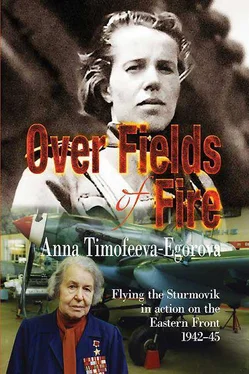12. “Is it natural flair or is it all God-given?”
Frontline veterans remember this simple biplane getting the most unexpected, sometimes overblown, sometimes ironic but always favourable nicknames. For the infantry it was ‘frontline starshina ’, the partisans nicknamed the U-2 ‘kitchen gardener’ or ‘cropduster’ for its incredible ability to land on tiny patches of ground, and seasoned pilots respectfully called the nimble plane ‘the duck’. But the nickname was not the point. The U-2 had won its glory by honest soldierly work: it transported wounded men, dispatched mail, flew reconnaissance flights, bombed the Hitlerites by night. Generals and Marshals, war correspondents and doctors considered it the best form of frontline transport. Its unusual maneuverability, simplicity of maintenance and ease of handling allowed it to conduct such operations as were for fast and heavy aircraft simply impossible.
It didn’t seem a big deal to fly the U-2 carrying orders, searching for military units, reconnoitring roads, carrying couriers and signal officers. But this seemingly routine work was fraught with such the surprises and dangers! What kind of routine was it if all flights towards the frontline for fast communications with secret mail, and flights beyond the enemy lines were by rights considered combat sorties? It was not for nothing our squadron was recommended for Guards rank, but the unit was too small for that. Only in 1944 was the 130th Squadron given the honorific name ‘Sevastopol’…
But 1941 wasn’t over and the front was moving east… While putting up increasing resistance to the enemy, our troops were nevertheless giving up their positions. During the retreat communications between units were sometimes lost and there is nothing worse than loss of control when you’re at war! The squadron’s flyers were sent into the air to restore it or to despatch necessary information or a required order. They would take off in rain, in fog, in any weather.
…On 21 August I received orders to fly to the 18th Army Headquarters. I was advised of the approximate locality where this headquarters ought to be, but once there I would have to clarify its position. The squadron commander warned me that there would be many Hitlerite fighter planes en route. Blink and they will knock you off straight away. I remember the weather was superb, typical August, and at another time I would have been glad of that, but now… In a clear sky a ‘cropduster’ was defenceless against Fascist fighters. You couldn’t get away from them — you had no speed. And plywood is not armour, it doesn’t stop bullets. And your only weapon was the revolver on your belt. The only escape was to dive towards the ground, spread your wings just above the grass and fly so low that you could hear your undercarriage mow the feather-like grass of the steppe.
And here I am hugging the ground. I have no navigator and I often look at the compass, the watch, the map, keep an eye on the ground: it’s quite close, under my wings. I am happy that I can recognise the farmsteads flashing by under me — the time I pass over them coincides exactly with the calculations. Of course, the compass is a good thing but I’m not much good with it. I prefer to compare the terrain I pass over with the map, and, to be honest, when working as a pilot instructor I rarely had to stick to a flight path, there were few ‘blind’ flights in the clouds or at night when you wholly rely on instruments. When farmsteads and gullies had stopped flashing under my wings and the barren steppe spread underneath, anxious thoughts crawled into my mind: what if this compass is off? Maybe they failed to get rid of the deviation? Now it seems to me that I shift course to the right… No, maybe, to the left! “Trust the compass, trust it… It’ll lead you where you need to go…” I assure myself, “it won’t let you down”.
Suddenly I see two approaching dots. “Messerschmitts,” I guess in a flash. Yes, that’s them! And now they’ve swooped over my head, insolently showing off the spiders of their swastikas. They let off a burst, swept past somewhere but came back straightway. I remember them covering my U-2 with their shadows but they couldn’t do anything else. So they left…
I sighed with relief: now I could concentrate on the ground rapidly flashing under my machine so as to get back my bearings. Here was the village where the headquarters of the 18th Army was. Noticing a small patch of ground with three U-2 planes — the Army Headquarters’ Signals Flight — I landed. My passenger, a naval captain of the Dnieper Flotilla — went to Headquarters and I had to wait for him. In the meantime the pilots from the Army Signals Flight refuelled my plane, treated me to watermelon and told me about the situation on this sector of the front.
On my way back I lost concentration and was immediately punished for it: everything got mixed up and confused in my head. I began to swing wildly from one side to another looking for any noticeable landmark but only the deserted steppe lay silently beneath… Calming down a bit I headed eastward and flew by compass. I saw a railway station. I tried to read its name but couldn’t. Then I decided to land and find out. There was a method of orientation called “questioning the local population”. It turned out to be the village of Porovka. The Tikhiy farmstead was nearby and I returned to the aerodrome safely. There Squadron Commander Boulkin asked me, knitting his brows, “Why have you been in the air so long?”
“There was a delay with my departure from the Army headquarters”, I weaseled.
It was the communications officer who told the major about our encounter with the Messerschmitts and about my desperate manoeuvres. I disliked Boulkin and I wasn’t the only one.
“Get some rest!” Boulkin said. “You’ll fly there again tomorrow.”
But on the next day I had to fly to Kalarovka near Melitopol. There was the headquarters of the 9th Army and I’d been ordered to deliver a communications officer there with urgent orders. The weather that day was excellent, visibility limitless. So as not to come across the Fascist hawks, I flew hugging the ground. Here a village appeared, buried in verdure, and I lifted the plane a little: with this altitude I could have easily snagged a tree, a post or some chimney. As soon as I climbed up my field of view improved and I immediately noticed, not far away, white huts clustered around a wide gully. Turning back to the lieutenant-colonel I waved my hand down: to say ‘that’s it, we’ve arrived’. But while I was closing in for landing I noticed unusual, somehow convulsive movement, on the roads leaving Kalarovka. The troops were moving mixed up with cattle, carts loaded with goods and chattels milled around under the wheels of military trucks. Empty tonne-and-a-half 72 72 Translator’s note — a most typical truck in the USSR back then — a variety of Ford trucks were built under licence.
trucks were sweeping past on the sides of the roads, the infantry was marching not in columns but in small groups few in number. An uneasy disorder was everywhere apparent…
I landed the plane near a windmill on a hillock, taxied right up against the mill and turned off the engine. “Something’s wrong”, the communications officer who had flown in with me muttered. “You stay here and wait for me to come.” And he ran down a footpath towards the village.
I began to look for something to camouflage the plane with and, finding nothing, sat under a wing and began to wait. I waited an hour, twenty minutes more, thirty… But the lieutenant-colonel still didn’t come back. I began to feel somewhat alarmed. The crackle of gunfire was heard from the gully: there could be no doubt a battle was breaking out down there…
Читать дальше












